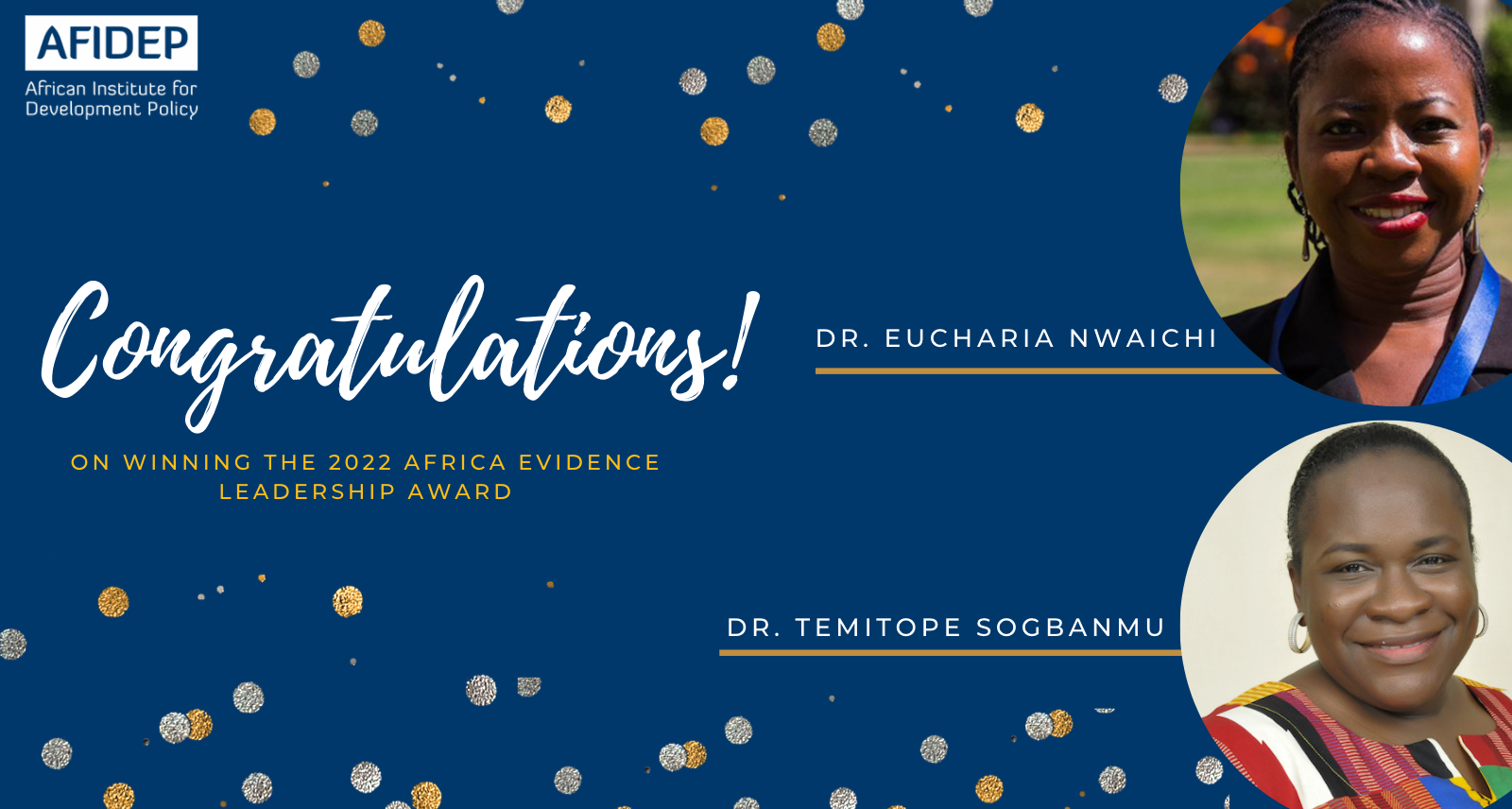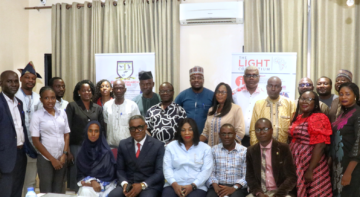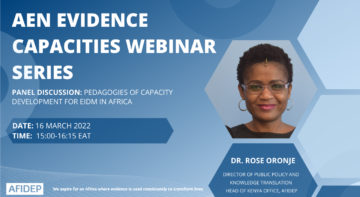Blogs

The African Institute for Development Policy (AFIDEP) congratulates two outstanding Evidence Champions, Dr Temitope Sogbanmu and Dr Eucharia Nwaichi, for winning this year’s Africa Evidence Leadership Award (AELA). The award is an initiative of the Africa Evidence Network (AEN) and seeks to recognise individuals who have demonstrated innovative and strategic leadership in the field of evidence-informed decision-making (EIDM) in Africa.
Between 2019 – 2021, Dr Sogbanmu and Dr Nwaichi were involved in AFIDEP’s Evidence Leaders Initiative (ELA) initiative, through which they were trained and mentored in knowledge translation and EIDM (read blog). Still, through the ELA initiative, the two won small grants and implemented work with government agencies in Nigeria that contributed to institutionalising EIDM in these agencies (read blog).
AFIDEP is therefore very proud of these two evidence champions for winning the prestigious AELA Award which illustrates AFIDEP’s contribution to the EIDM practice and field in Africa.
Dr Sogbanmu, who is a Lecturer I at the Zoology Department of the University of Lagos (Nigeria), has been recognised by AEN as an evidence intermediary. Dr Sogbanmu said:
“This win is a recognition of the passion and efforts to promote the impactful use of scientific research or evidence through stakeholder collaborations in the evidence ecosystem for environmental sustainability. When research/evidence informs decisions within the ambit of the contexts and experiences within nations, more robust and sustainable development is assured.”
Dr Nwaichi, who is an Associate Professor at the University of Port Harcourt in Nigeria, and President of the Organization for Women in Science in the Developing World, has been recognised by AEN as an evidence producer. Dr Nwaichi said:
“I was overwhelmed with joy on learning about my emergence as the 2022 Africa Evidence Leadership Award- Producer category recipient. For me, this award is an acknowledgement of a job well done and justification for the long-suffering, the efforts, and the earnest and energetic work that went into winning it.”
Engagement with the Evidence Leaders Initiative
Research communications and policy engagement training (January 2020)
Dr Sogbanmu and Dr Nwaichi were part of 23 distinguished researchers drawn from East and West Africa for a capacity development workshop in EIDM. The workshop imparted research communications and policy engagement skills in the researchers towards enhancing and understanding of the value of, and strategies for EIDM. The workshop also ignited/strengthened the participants’ commitment to contribute to efforts to institutionalise a culture of EIDM in their respective spaces.
Award of seed grants to institutionalise EIDM in governments (2020)
The competitive seed grants were awarded to four AAS fellows, of which two were Dr Sogbanmu and Dr Nwaichi. The seed grants were awarded on merit of innovative approaches to spearhead the implementation of initiatives aimed at addressing bottlenecks that curtail institutionalisation of EIDM in government. Other awardees included Professor David Bakibinga (Head of the Department of Commercial Law – Makerere University, Uganda) and Dr Faith Mabiki (Senior Lecturer – Sokoine University of Agriculture, Tanzania).
From the seed grant, Dr Sogbanmu conceptualised the Evidence Use in Environmental Policymaking in Nigeria (EUEPiN), a platform for capacity building and synergy between evidence producers, evidence users and brokers in the field of environmental management. Through EUEPiN, Dr Sogbanmu has made significant contributions of work as an evidence intermediary to the African evidence ecosystem. In relation to the award and her initiative, Dr Sogbanmu said
“I feel quite elated and honoured to have been voted the winner of the award. It shows some evidence of the visibility and impact of the EUEPiN Project, made possible through our funders, team of advisors, research/project team, institutional partners, workshop facilitators, my university management, our trained participants who are now part of the EUEPiN EIDM Community of Practice, EUEPiN workshop participants ‘in waiting’, our followers and well-wishers from all over the world.”
Dr Nwaichi, on the other hand, drove EIDM activities under her initiative, Developing Guidelines for Evidence Use in the Nigeria Natural Medicine Development Agency (NNMDA). Interventions included training workshops for researchers and policy-makers on EIDM and development of EIDM guidelines for NNMDA. Her work has so far informed consideration for use of evidence in conceptualising, designing and carrying out studies by NNMDA, policymakers and researchers.
ELA’s Evidence Leadership Award (November 2020)
ELA’s first Evidence Leadership Award aimed to recognise scientists within the AAS networks championing EIDM, was awarded to three scientists to recognize their efforts in promoting and enabling evidence use in government decision-making in Africa. The purpose of the award is to strengthen efforts by AAS scholars and researchers that seek to promote, support, and enable evidence-informed decision-making within government agencies in their countries. Dr Nwaichi was one of the two runners up and received a symbolic cash award of US$ 2,500 to further support her EIDM activities and efforts. The overall winner of the award was Professor Madiagne Diallo from Senegal while the other runner-up was Professor Friday Okonofua Ebhodaghe.
Sharing Outcomes and Lessons of the Evidence Leaders in Africa Initiative (August 2021)
As ELA was coming to its completion in 2021, AFIDEP and AAS organized a three-part webinar series to share key highlights and lessons of the initiative. Both Dr Sogbanmu and Dr Nwaichi participated in the webinar series, more so in the first webinar that focused on the experiences of researchers in institutionalising EIDM in government agencies in Africa.
AFIDEP wishes both Dr Sogbanmu and Dr Nwaichi the very best in their respective journeys as evidence champions. We look forward to more engagement and collaboration with the distinguished researchers in promoting evidence use in Africa and transforming lives in Africa.
Related Posts





